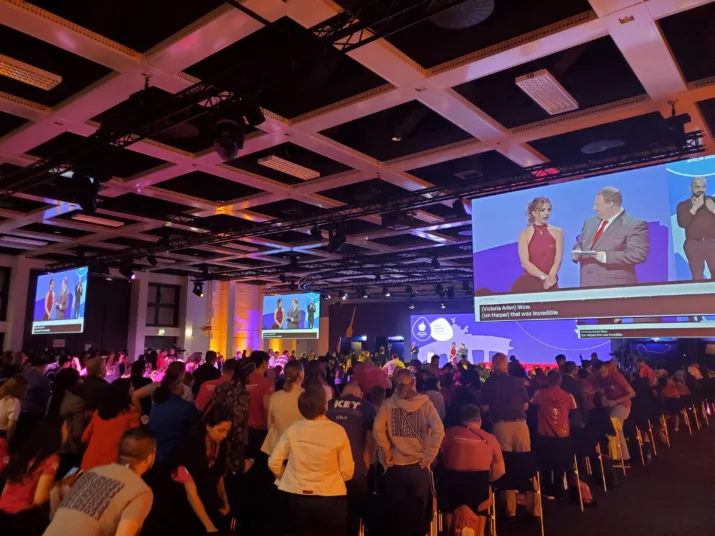
Opening Ceremony of the Global Forum for Inclusion. The innovative, inclusive and interdisciplinary conference format is part of the Special Olympics World Games. Photo: Hanna Winker
Event at the Global Forum for Inclusion
Inclusive Spaces: Where Will Society meet in the Future?
Imagine a society where people with and without disabilities come together to enjoy culture and exchange knowledge… In an event organized by FUTURIUM, 40 individuals from different countries explored what inclusive gathering places could look like. The occasion for this exploration was the Special Olympics World Games 2023 in Berlin.

Opening Ceremony of the Global Forum for Inclusion. The innovative, inclusive and interdisciplinary conference format is part of the Special Olympics World Games. Photo: Hanna Winker
How would individuals with intellectual disabilities design spaces to enjoy culture, broaden perspectives, and exchange ideas? And what themes and activities can be used to connect people with and without disabilities?
During this international exchange, individuals from six countries – El Salvador, Germany, Hong Kong, India, Luxembourg, and the USA—shared their experiences with inclusive gathering places. All the ideas were captured in drawings.
SOME INSPIRING STORIES AND BIOGRAPHIES
A New Inclusive Team Spirit:
In El Salvador, an art festival is currently being initiated to bring diverse individuals together to collaborate and shape public spaces. Gabriela (23) and Amy (19) from San Salvador are among the initiators. They came to Berlin to discuss and further develop their project at the Special Olympics Youth Summit. Back in El Salvador, they plan to advance the project in collaboration with Special Olympics, the San Salvador City Hall, and the scouting organization.
Gabriela and Amy draw motivation for their engagement mainly from their own lives, where individuals with intellectual disabilities are hardly visible. Especially Gabriela, who lives with a disability herself, aims to increase the presence of people with disabilities in public through her work in the inclusive team. In addition to their roles as festival organizers, Gabriela is a Special Olympics athlete in artistic gymnastics and is currently learning sign language to become a teacher. Amy is studying modern languages and is part of the "Unified Generation" advocating for an inclusive society.
Three examples (from left): Stefanie (Germany), Gabriela and Amy (El Salvador) and Caitlin (USA) were guests at the Global Forum and contributed their ideas.
Engaging Spaces for Learning and Exchange:
Libraries are unique places to acquire knowledge, study, and exchange ideas. Caitlin from the USA shares her work experiences from the perspective of a person with intellectual disabilities. She works for the Special Olympics team and was previously employed at a library. Caitlin talks about her work at the library and provides specific suggestions for improving the design of inclusive spaces:
- Better orientation: Clear signage in places, including signs with large fonts, informative signs for exits, restrooms, staircases, and elevators, as well as location maps.
- Natural light: Inclusive meeting spaces should have access to daylight. Flickering and LED lights often cause headaches and fatigue.
- Good acoustics: Meeting spaces with poor acoustics make it difficult to hear conversations. Some individuals with intellectual disabilities have hearing impairments.
- Comfortable spaces: Inclusive spaces should be open and uncluttered. Events should take place in larger rooms to accommodate participants.
Inclusion as a Daily Experience:
How can inclusive exchange between communities become a daily experience? Stefanie founded Germany's first inclusive coworking space in Berlin, called Tuechtig. Here, individuals can rent one or more desks that suit their specific work requirements. Workshops and meeting rooms are accessible to individuals of smaller stature, wheelchair users, and those with hearing or visual impairments. Assistance is available as needed. Stefanie reports, how working in the same location fosters exchange between people from different communities and professions.
The everyday experience of "inclusion" was extensively discussed among the participants. Stronger political commitment to inclusion in the workplace is being demanded across borders as a priority by policymakers. Quotas for the employment of people with disabilities already exist in various countries. People with disabilities desire stronger voices advocating for the implementation to be further advanced.
Guests:
Caitlin Baran, Athlet (USA)
Amy Ramírez Estrada + Gabriela Velásquez Rodríguez, Project initiators (El Salvador)
Elisa Gärtner + Andrea Florez Jurado, FUTURIUM (Germany)
Torsten Holzapfel + Anne-Christin Plate, Theater Thikwa (Germany)
Stefanie Trzecinski, KOPF, HAND + FUSS (Germany)
The speakers and their biographies are online at the Global Forum Website.